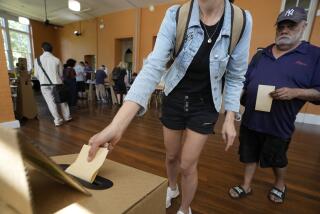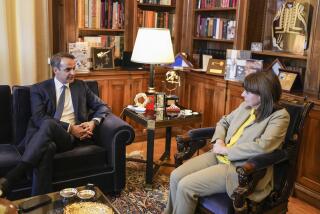Lithuanian Leader Fails to Get Mandate on Power
- Share via
MOSCOW — Lithuanians dealt a serious blow over the weekend to Vytautas Landsbergis, the music-historian-turned-politician who led the Baltic state back to full independence, by refusing full approval to the strong presidency he had proposed.
“The referendum has been held, but it has not given a concrete result,” Landsbergis complained Sunday, expressing disappointment at his failure to receive the clear vote of confidence as well as the enhanced powers that he had sought to counter political bickering and move more boldly in reforming the Lithuanian economy.
According to preliminary results released Sunday, nearly 70% of voters participating in Saturday’s referendum endorsed Landsbergis’ proposal to create a U.S.-style executive presidency, but because of a low turnout this was less than 40% of the 2.5 million Lithuanians eligible to vote.
That left the issue unresolved because of a legal requirement, inherited from the time when Lithuania was a Soviet republic, that at least half of the voters endorse a referendum proposal to give it validity; Soviet courts never clarified whether that meant half of all voters or half of those going to the polls.
Landsbergis, however, accepted that the proposal had failed, telling reporters Sunday in Vilnius, the Lithuanian capital, that voters were not ready for an executive presidency now. Although usually called “president,” Landsbergis is actually chairman of the Lithuanian Parliament and, as such, has limited powers.
“Political events in Lithuania have their order, and the main issue now is parliamentary elections this autumn,” Landsbergis said. “Probably after that we shall return to the presidential issue, but perhaps with more limited powers.”
Under the proposal put to voters Saturday, the president would have had the power to appoint and dismiss the prime minister and to dissolve Parliament and call new elections to resolve a political crisis. He would have had the authority to make many decisions without parliamentary approval and to rule by decree in the event of a crisis. The president would have been elected in September to a five-year term with a maximum of two terms.
A strong favorite to win election as president if the proposal had been approved, Landsbergis had campaigned hard to establish the new post as essential to move Lithuania quickly through the post-Soviet era.
“The referendum showed the passivity of citizens, and this had a decisive effect,” he said, adding that many farmers had been too busy in their fields to come to the polling stations in town.
Landsbergis had contended that with Parliament split into nine factions and deputies continuously overturning government decisions, he cannot deal decisively with the economy.
“The goal of the referendum is to end Lithuania’s deep political crisis,” Audrius Azubalis, a parliamentary spokesman, said on the eve of the plebiscite. “A firm result will mean the start of our recovery.”
Landsbergis’ critics had argued, however, that vesting the sweeping powers he sought in one person was too great a danger for Lithuania’s embryonic democracy; instead, they urged the country to develop a parliamentary, rather than a presidential, form of government.
The plebiscite was widely seen in Lithuania as a referendum on Landsbergis’ leadership, and Sunday he called the mixed results “interesting, significant and important.”
“The situation remains, in practical terms, as it was before the referendum,” Landsbergis said. “The vote has not provided a channel for settlement of the political tensions here . . . but there is basic direction in our political life now for the preparations for elections for the Sejm, the new Parliament of Lithuania.”
Chosen as the president of the Lithuanian Supreme Council, the republic’s Parliament, after elections in early 1990, Landsbergis led the country through the bitter, sometimes bloody struggle to break away from the Soviet Union, finally winning Moscow’s recognition of its independence last September.
But Lithuania remains heavily dependent on Russia economically, and its independence is undermined by the continued presence of 35,000 former Soviet troops in the country as well as those in the neighboring Baltic states of Latvia and Estonia.
More to Read
Sign up for Essential California
The most important California stories and recommendations in your inbox every morning.
You may occasionally receive promotional content from the Los Angeles Times.













